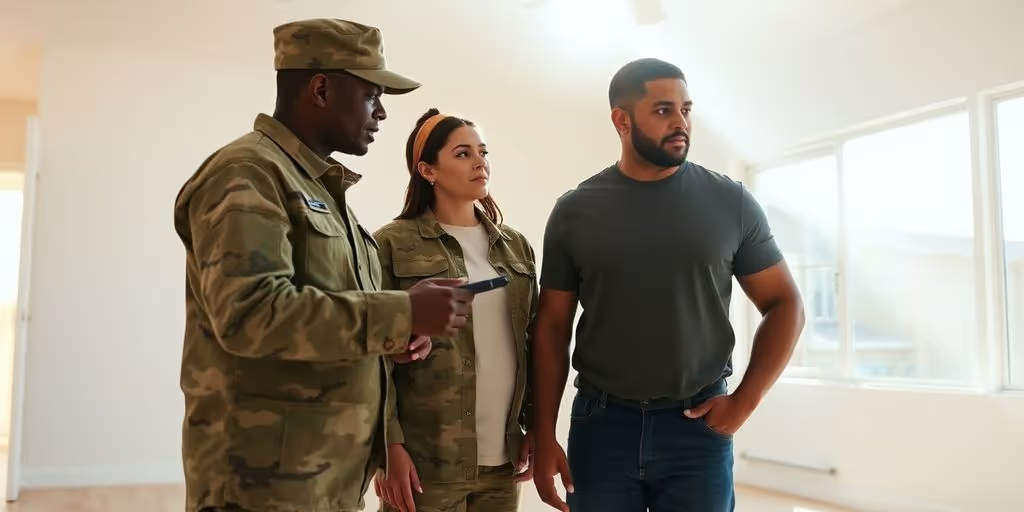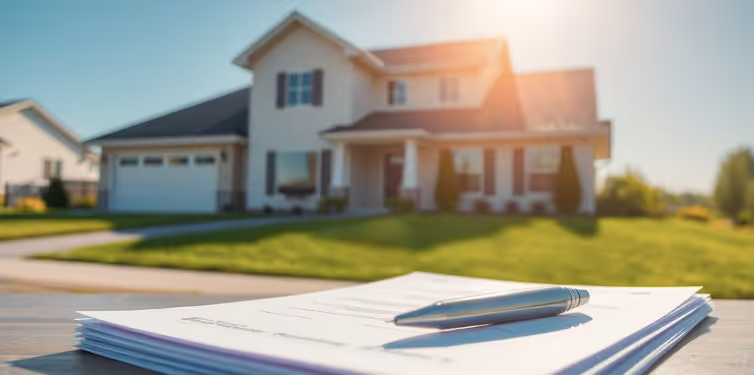Understanding VA Loan Home Requirements and Inspection Processes
November 19, 2025
VA loans have property requirements to ensure safety and livability, checked by a VA appraisal. However, a home inspection is recommended for a more thorough evaluation. It can uncover hidden issues and help you negotiate repairs or a lower price with the seller. While not mandatory, a home inspection provides valuable peace of mind and better bargaining power.

Buying a home with a VA loan is a great benefit for many service members, veterans, and their families. But, like any big purchase, there are some specific steps and checks involved. It's easy to get confused about what's required, especially when it comes to property condition. This article will help you understand the key things you need to know about VA loan home requirements inspection processes, so you can feel more confident as you look for your new place.
Key Takeaways
• VA loans have specific property standards to make sure the home is safe and sound.
• A VA appraisal is not the same as a home inspection; they serve different purposes.
• While not always required, getting a home inspection is a really good idea to find potential problems.
• Inspections can give you solid facts to talk about repairs or price with the seller.
• Knowing the difference between an appraisal and an inspection helps you protect your investment.
Understanding VA Loan Home Requirements

Defining VA Loan Eligibility
First things first, who can actually get a VA loan? It's primarily for veterans, active-duty service members, members of the National Guard and Reserves, and eligible surviving spouses. Each group has specific requirements related to length of service or time in the Guard/Reserves. Meeting these requirements is the first step in the home-buying journey with a VA loan.
Key Minimum Property Requirements
The VA has what are called Minimum Property Requirements (MPRs). These aren't just suggestions; they're requirements that a property must meet to be eligible for a VA loan. Think of them as a baseline for safety and livability. Here are some key MPRs:
• Adequate and safe roofing
• Functioning HVAC, electrical, and plumbing systems
• Free from hazards like lead-based paint or mold
• Safe access to the property
The Role of VA Appraisals
The VA appraisal is a critical part of the loan process. It's more than just determining the market value of the home. The appraiser also checks to see if the property meets those Minimum Property Requirements. If the appraiser finds issues, they'll need to be addressed before the loan can be finalized. The Notice Of Value (NOV) will be issued after the appraisal is complete, and it's valid for six months. It's a good idea to consider a home inspection after receiving the NOV.
The Importance of a Home Inspection
Why a Home Inspection is Recommended
While a VA appraisal is required, a separate home inspection is highly recommended. It gives you a much clearer picture of the property's condition beyond just meeting the VA's minimum standards. Think of it as a deeper dive into the home's overall health. It's easy to think you can skip it to save money, but that could be a costly mistake down the road. A home inspection can reveal hidden problems that the VA appraisal might not catch.
Benefits of a Thorough Inspection
There are several key benefits to getting a thorough home inspection:
• Peace of mind: Knowing the true condition of the home can give you confidence in your purchase
• Negotiating power: If the inspection reveals issues, you can negotiate repairs or a lower price with the seller
• Avoiding surprises: Discovering problems early can prevent costly repairs after you move in
Negotiating Power with Inspection Findings
One of the biggest advantages of a home inspection is the negotiating power it gives you. If the inspection turns up problems, you have options:
• Ask the seller to make the repairs before closing
• Negotiate a price reduction to cover the cost of repairs
• Offer a credit at closing
• Walk away from the deal if the issues are too major
Distinguishing VA Home Inspections from Appraisals
VA Appraisal Versus Home Inspection
It's easy to mix up VA appraisals and home inspections, but they serve different purposes. A VA appraisal is mandatory and focuses on determining the fair market value of the property and ensuring it meets the VA's Minimum Property Requirements (MPRs). A home inspection, while not required by the VA, is a thorough examination of the home's condition.
Purpose of Each Process
The VA appraisal protects both the veteran and the lender. It makes sure the home is worth the loan amount and is safe, sound, and sanitary. The appraisal determines a home's value, while a home inspection gives you a detailed look at the property's condition.
Who Conducts Each Review
• VA Appraisal: Required, focuses on value and MPRs, conducted by a VA-approved appraiser
• Home Inspection: Optional, focuses on condition, conducted by a licensed home inspector
• MPRs: Ensure basic safety, soundness, and sanitation
Common Elements of a VA Home Inspection
Interior and Exterior Examination
• Siding, trim, walkways, decks, patios checked for cracks or damage
• Inside: walls, ceilings, floors, doors, windows checked for wear and tear
HVAC, Plumbing, and Electrical Systems
• HVAC system checked for efficiency and function
• Plumbing tested for leaks, water pressure, and drainage
• Electrical inspected for safety, up-to-code wiring, breakers, and outlets
Attic, Roof, and Foundation Checks
• Attic: Insulation, ventilation, pests, leaks
• Roof: Shingles, flashing, gutter conditions
• Foundation: Cracks, moisture, signs of shifting
Specific VA Loan Home Requirements and Inspections
Pest and Termite Inspection Requirements
In certain states or counties, a pest inspection is mandatory. Termites and wood-destroying organisms can weaken a home’s foundation and structure, so VA loans often require these inspections depending on location.
Addressing Health and Safety Concerns
Issues like lead-based paint, unsafe water, or nonfunctional sewage systems need to be corrected before VA approval. A home inspection will flag these risks in more detail than an appraisal.
Structural Integrity and Property Access
The property must be structurally sound with solid roofing and foundation. Also, it needs to have legal and practical access from a public or private road — no jumping fences or crossing someone else’s lawn to get home.
Navigating Potential Issues with VA Loan Home Requirements

Identifying Property Defects
If a VA appraiser or home inspector finds problems, you’ll be given time to resolve them. The key is knowing whether they’re minor fixes or deal-breakers.
Negotiating Repairs with Sellers
If your inspection finds issues, here are your options:
• Ask the seller to fix them before closing
• Request a price cut to cover your costs later
• Split the cost of repairs with the seller
When to Walk Away from a Purchase
• Repairs are too expensive
• Seller refuses to budge
• Your gut says it’s not worth the risk
Ensuring a Safe and Sanitary Home with VA Loan Home Requirements
Water Supply and Sewage Disposal
The home must have a safe, potable water supply. If it uses a well, testing or treatment may be needed. A septic system must be functional, or the home must be connected to a working public sewer system.
Zoning and Building Code Compliance
The home must comply with zoning laws and local code. Think set-back rules, occupancy limits, and construction permits. This protects you from future fines and rebuild demands.
Hazard Area Considerations
Homes in flood zones, earthquake-prone areas, or near hazardous sites must be evaluated for added risk. You may need extra insurance — and the VA will flag these concerns during the appraisal.
Wrapping Things Up
So, while the VA doesn't actually make you get a home inspection, it's still a really good idea. Think of it as an extra layer of protection for your big purchase. Even with the VA's thorough appraisal process, which checks a lot of boxes, a home inspection can catch those hidden problems. It just gives you a clearer picture of what you're getting into, and that's always a good thing when you're buying a house.
Frequently Asked Questions
What exactly is a VA loan?
VA loans are special home loans backed by the U.S. government for eligible service members, veterans, and some surviving spouses. They often come with great benefits like not needing a down payment, good interest rates, and no private mortgage insurance.
Do I have to get a home inspection for a VA loan?
No, the VA doesn't make you get a home inspection. But, it's a really good idea to get one. It helps you find out about any hidden problems with the house before you buy it.
What's the difference between a VA appraisal and a home inspection?
A VA appraisal checks if the home meets certain basic safety and living standards set by the VA, and it figures out the home's value. A home inspection is a more detailed look at the house's condition, pointing out any issues that might need fixing.
What does a home inspection cover?
A home inspection looks at almost everything! This includes the inside and outside of the house, the heating and cooling systems, plumbing, electrical wiring, the roof, attic, and even the foundation.
What happens if the home inspection finds problems?
If the inspection finds problems, you can try to get the seller to fix them or lower the price of the house. Having an inspection gives you a chance to talk about these things before you're fully committed to buying.
Are there any specific inspections always required for a VA loan?
While a general home inspection isn't always required, sometimes a pest inspection is needed, depending on where the house is located. Also, if the VA appraiser sees something concerning, they might ask for another specific inspection.

Alex Chen

Alex Chen













Get in touch with a loan officer
Our dedicated loan officers are here to guide you through every step of the home buying process, ensuring you find the perfect mortgage solution tailored to your needs.
Options
Exercising Options
Selling
Quarterly estimates
Loans
New home

Manténgase siempre actualizado sobre artículos y guías interesantes.
Todos los lunes, recibirás un artículo o una guía que te ayudará a estar más presente, concentrado y productivo en tu vida laboral y personal.





.png)
.png)
.png)
.avif)
.avif)
.avif)
.png)
.png)
.png)
.avif)
.png)
.png)
.avif)
.png)
.avif)
.png)
.avif)
.avif)
.avif)
.avif)
.avif)
.avif)